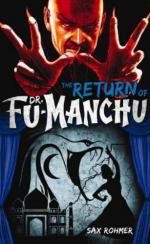For the twentieth time, I should think, I carried the ash-tray in my hand and laid it immediately under the table-lamp in order to examine its contents. In the little brass bowl lay a blood-stained fragment of grayish hair attached to a tatter of skin. This fragment of epidermis had an odd bluish tinge, and the attached hair was much darker at the roots than elsewhere. Saving its singular color, it might have been torn from the forearm of a very hirsute human; but although my thoughts wandered unfettered, north, south, east and west; although, knowing the resources of Fu-Manchu, I considered all the recognized Mongolian types, and, in quest of hirsute mankind, even roamed far north among the blubbering Esquimo; although I glanced at Australasia, at Central Africa, and passed in mental review the dark places of the Congo, nowhere in the known world, nowhere in the history of the human species, could I come upon a type of man answering to the description suggested by our strange clue.
Nayland Smith was watching me curiously as I bent over the little brass ash-tray.
“You are puzzled,” he rapped in his short way.
“So am I—utterly puzzled. Fu-Manchu’s gallery of monstrosities clearly has become reinforced; for even if we identified the type, we should not be in sight of our explanation.”
“You mean,” I began . . .
“Fully four feet from the window, Petrie, and that window but a few inches open! Look”—he bent forward, resting his chest against the table, and stretched out his hand toward me. “You have a rule there; just measure.”
Setting down the ash-tray, I opened out the rule and measured the distance from the further edge of the table to the tips of Smith’s fingers.
“Twenty-eight inches—and I have a long reach!” snapped Smith, withdrawing his arm and striking a match to relight his pipe. “There’s one thing, Petrie, often proposed before, which now we must do without delay. The ivy must be stripped from the walls at the back. It’s a pity, but we can not afford to sacrifice our lives to our sense of the aesthetic. What do you make of the sound like the cracking of a whip?”
“I make nothing of it, Smith,” I replied, wearily. “It might have been a thick branch of ivy breaking beneath the weight of a climber.”
“Did it sound like it?”
“I must confess that the explanation does not convince me, but I have no better one.”
Smith, permitting his pipe to go out, sat staring straight before him, and tugging at the lobe of his left ear.
“The old bewilderment is seizing me,” I continued. “At first, when I realized that Dr. Fu-Manchu was back in England, when I realized that an elaborate murder-machine was set up somewhere in London, it seemed unreal, fantastical. Then I met—Karamaneh! She, whom we thought to be his victim, showed herself again to be his slave. Now, with Weymouth and Scotland Yard at work, the old secret evil is established again in our midst, unaccountably—our lives are menaced—sleep is a danger— every shadow threatens death . . . oh! it is awful.”




